|
|
|
Sort Order |
|
|
|
Items / Page
|
|
|
|
|
|
|
| Srl | Item |
| 1 |
ID:
152871
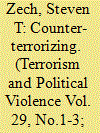

|
|
|
|
|
| Summary/Abstract |
In this article I identify and evaluate numerous reasons why torture became common practice during the state counterterrorism campaign in Peru between 1980 and 2000, despite international and domestic legal obligations to protect human rights. I describe common structural conditions, organizational factors, and individual-level explanations often associated with torture practices. I then identify seven logics and motivations behind torture use in counterterrorism campaigns. I describe and analyze actual torture use in Peru using quantitative incident-level data, and I provide descriptive statistics concerning variation in the frequency and methods of torture. Finally, I examine specific incidents of torture to illustrate and assess the different logics and motivations for torture. I draw heavily from testimonies collected by Peru's Truth and Reconciliation Commission. I also rely on personal interviews carried out during fieldwork in the Junín and Ayacucho regions of Peru. I find that aggregate torture incidents generally coincide with political developments and shifts in violence levels and that the various state security forces used torture differently. A review of testimonies regarding specific incidents of torture suggests that multiple logics motivate state security forces, even for a single incident of torture, complicating academic efforts to formulate a parsimonious causal explanation.
|
|
|
|
|
|
|
|
|
|
|
|
|
|
|
|
| 2 |
ID:
145168
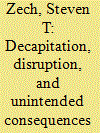

|
|
|
|
|
| Summary/Abstract |
This study examines the unintended consequences of decapitation strategies. Two Islamist terror networks in Spain have been used to critically evaluate theories of leadership removal guided by large-N cross-sectional research. Arguably, current models neglect to include relational variables that constitute the foundation for policies of network disruption. Spanish terror networks are mapped out over a 10-year period (1995–2004) to demonstrate the importance of network variables. Policies meant to disrupt militant networks can generate unintended consequences, as was the case with Spain’s Operation Dátil following the 9/11 attacks on the Twin Towers and the Pentagon in the United States. The Madrid train bombing network developed in the vacant political space following the counterterrorism operation that targeted radical Islamists in Spain.
|
|
|
|
|
|
|
|
|
|
|
|
|
|
|
|
| 3 |
ID:
177838


|
|
|
|
|
| Summary/Abstract |
State security forces have been locked in an ongoing struggle with the Communist Party of the Philippines – New People’s Army (NPA) for nearly fifty years. Over the course of the conflict, thousands of civilians across generations have taken up arms and participated in the counterinsurgency campaign. Citizen Armed Force Geographical Units (CAFGU) and other pro-government militias have played a key auxiliary role in combatting the insurgency and providing community security. This article draws on survey and interview data collected from CAFGU participants to examine the factors that influence decisions to join, as well as their implications for sustained participation and counterinsurgency strategy. Existing research on joining armed groups recognizes how environmental conditions, group processes, and individual motives interact to help explain participation. We shift our focus to the realm of the household and highlight how considerations related to that site affect participation. Our findings suggest that the need to avoid economic disaster and ensure a secure subsistence can have a notable influence on decisions to enlist and individual experiences as CAFGU. These effects, in turn, have implications for how the Philippine government carries out its counterinsurgency.
|
|
|
|
|
|
|
|
|
|
|
|
|
|
|
|
| 4 |
ID:
188765
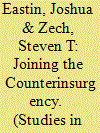

|
|
|
|
|
| Summary/Abstract |
What motivates civilians to fight in a progovernment militia? This article draws on survey and interview data from active members of Citizen Armed Forces Geographical Units (CAFGU), a progovernment militia in the Philippines, to evaluate why individuals enlist. We find poverty and unemployment to be key drivers of group membership, and the biggest attraction a steady paycheck. This situation presents a moral hazard for the Philippine government and other states that rely on impoverished citizens to wage counterinsurgency: while doing so can be cost-effective, the need to keep costs low might also impede efforts at socioeconomic or political reform.
|
|
|
|
|
|
|
|
|
|
|
|
|
|
|
|
| 5 |
ID:
146239
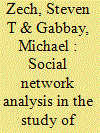

|
|
|
|
|
| Summary/Abstract |
Research using social network analysis to study terrorism and insurgency has increased dramatically following the 9/11 attacks against the United States. This research emphasizes the importance of relational analysis and provides a variety of concepts, theories, and analytical tools to better understand questions related to militant group behavior and outcomes of terrorism and insurgent violence. This paper defines key network concepts, identifies important network metrics, and reviews theoretical and empirical research on network analysis and militant groups. We find that the main focus of existing research is on organizational analysis and its implications for militant group operational processes and performance. Few studies investigate how differences in network structure lead to divergent outcomes with respect to political processes such as militant group infighting, their strategic use of violence, or how politically salient variables affect the evolution of militant cooperative networks. Consequently, we propose a research agenda aimed at using network analysis to investigate the political interactions of militant groups within a single conflict and provide illustrations on how to pursue this agenda. We believe that such research will be of particular value in advancing the understanding of fragmented civil wars and insurgencies consisting of multiple, independent militant groups.
|
|
|
|
|
|
|
|
|
|
|
|
|
|
|
|
| 6 |
ID:
191004
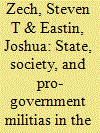

|
|
|
|
|
| Summary/Abstract |
Examining militia relationships with the government and civilian populations can help scholars and policymakers better assess differences in militia form, function, and behavior. In this article, we examine the Civilian Armed Forces Geographical Units (CAFGU), a pro-government militia in the Philippines, to better understand how militia participants view insurgents, politicians, state security forces, and civilians based on their experiences serving in the group. We argue that analyzing these beliefs is critical to understanding how militias influence civilian security and the risk of political violence in conflict-contested areas, as well as the trajectory of civil conflict in states like the Philippines that rely on militias to perform core security functions. We base the analysis on surveys and interviews with CAFGU members and civilians living in the Eastern Visayas, a region of active and ongoing conflict, where insurgents and other armed militants advance their aims through acts of violence and terrorism. In doing so, we contribute to a growing literature on the role that militias play in civil war, as well as the implications that follow when states choose to arm “civilians” to aid in counterinsurgency and conflict suppression.
|
|
|
|
|
|
|
|
|
|
|
|
|
|
|
|
|
|
|
|
|